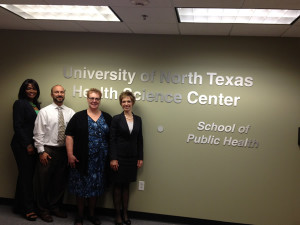Residency Experiences
May 16, 2013 • Uncategorized
Leadership starts with you and must engage others – that’s what Doctor of Public Health (DrPH) Program Director Christine Moranetz, PhD, reminds CPH graduate students in the UNTHSC DrPH in Public Health Practice program. This spring, four graduate candidates from the program shared their perspectives on “Public Health Leadership: A Model for the Future” at a symposium on their student residency experiences over the last year.
The final component toward graduation, and a critical milestone, involves a minimum of 720 hours of residency experience.
According to DrPH degree candidate Joyce Hood MPH, RN, COHN-S, who has worked as Director of Occupational Health Services for Cook Children’s Health Care System for the last 12 years, the residency program is important in “putting it all together,” combining both classroom studies and the real-world experience to move students “out of the box” to look at public health leadership in new ways.
For Hood, that step out of what she calls her “usual comfort zone” involved leading a project for Cook’s Community Health Outreach and Center for Children’s Health in an area she had never worked before, to address child abuse in Wise County. Working with a local coalition, Hood developed a framework, evaluation measures, communication plans and tactical initiatives that have already begun, including baseline surveys, parenting classes (called “Parent Cafes”) in churches and schools, and special training programs for parents of newborns.
Additionally, the survey tool that Hood developed to gather baseline information about protective, predictive and risk factors for child abuse has been selected to be used as a model for other coalitions in North Texas. Having “never worked with a community coalition before,” Hood says she learned the importance of developing relationships and building trust in a leadership role, as well as the understanding that every group is different, with its own culture that should be respected.
For Tyson Bain, MS, who has worked as a Health Services Researcher for Baylor Health Care System for over three years, the challenge was to evaluate and provide direction on Baylor’s corporate wellness initiatives.
“The takeaway for me,” Bain says, “was an understanding of the far-reaching operational and business aspects involved in developing a wellness program for almost 20,000 employees, as well as the collaborations needed to bring in other parties, such as the vendors who provide services and screenings.”
Lillian Agbeyegbe, MPH, CHES, who completed her residency at the Rose Brooks Center in Kansas City, Missouri, worked on domestic violence issues, her area of career interest.
“Much has been done to identify victims of abuse and remove them from the situation when they seek healthcare services,” Agbeyegbe notes, “but this project was aimed at women who have already removed themselves from exposure to abuse but are not yet engaged in routinely accessing healthcare services.” Agbeyegbe initially surveyed the needs of this population, the challenges they face in accessing care, and then developed a framework for structuring onsite healthcare services within a domestic violence organization, along with an internal/external communications plan.
One of the most important aspects of her experience, she says, is that she learned how important it is to take care of the staff as well as the client. “Staff are exposed to challenging and sometimes traumatic, even life-threatening experiences,” she says, “making it even more critical that they take time for themselves and address their own needs as well.”
After graduation, Agbeyegbe, who is originally from Nigeria, hopes to work for an organization that operates internationally to address women’s health and domestic violence.
Jordan Eaton’s residency focused on operations and implementation of INTERACT, a quality improvement process to reduce unnecessary hospitalizations for the senior population at Broadway Plaza Cityview, one of the Brookdale Senior Living, Inc.’s 646 senior housing communities.
INTERACT is part of a $7.3 million grant between UNTHSC, Brookdale, Loopback Analytics and Florida Atlantic University.
Working under the Broadway Plaza Cityview executive director, Eaton created a step-by-step, strategic manual for all executive directors and healthcare administrators in Brookdale skilled nursing and assisted living communities, to help them become valued hospital partners in their respective markets. The manual offers guidance on developing partnerships with hospitals, implementing quality improvement programs for early recognition of changes in residents’ health status, signs to watch for, how to engage the physician, and internal/external challenges that could be faced to efficiently determine if a patient needs to return to the hospital or if other treatment options should be pursued.
In addition to developing relationships with top-level CEOs and executive leaders, Eaton says she learned the importance of assessing situations at the management level and influencing leaders and staff to build support for common goals. She says she learned that “you have to take risks and be strategic, do things you’ve never done before” because of today’s rapidly-changing healthcare landscape.
Eaton, who graduates this May alongside her husband Brent, a TCOM student, plans to move to Ohio, where Brent will complete an anesthesiology residency at Cleveland Clinic and she will work as a health coach.
The DrPH in Public Health Practice focuses on building student competencies in advocacy, communication, community and cultural orientation, critical analysis, leadership, management, professionalism and ethics.



Social media